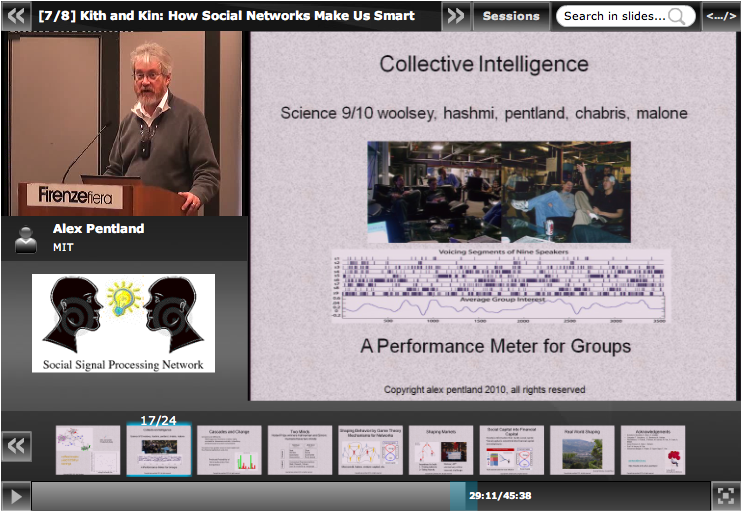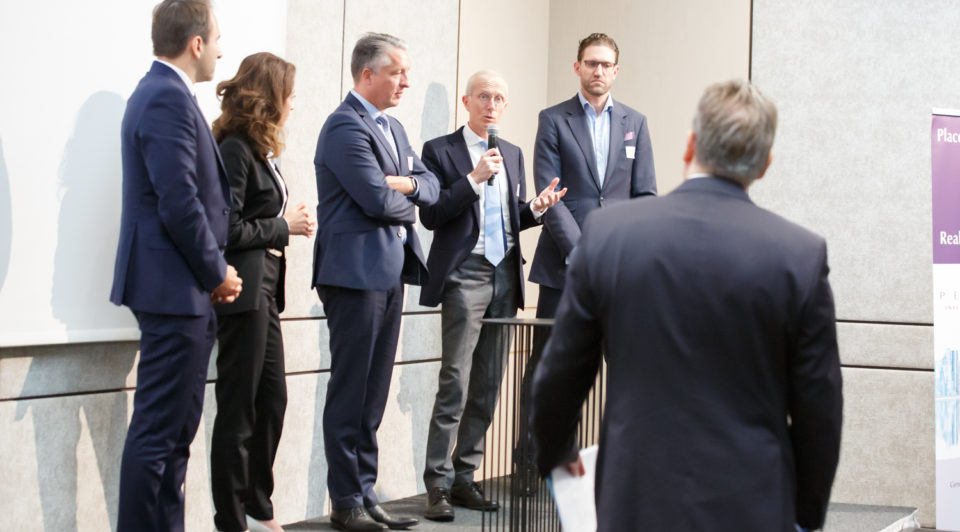ACM Multimedia 2010 is the worldwide premier multimedia conference and a key event to display scientific achievements and innovative industrial products.
 Klewel was mandated to webcast one of the workshops, WS20 – SSPW 2010 on October 29, 2010 in Firenze, Italy: ACM Workshop on Social Signal Processing, organized by Alessandro Vinciarelli, Maja Pantic, Alex Pentland (Website)
Klewel was mandated to webcast one of the workshops, WS20 – SSPW 2010 on October 29, 2010 in Firenze, Italy: ACM Workshop on Social Signal Processing, organized by Alessandro Vinciarelli, Maja Pantic, Alex Pentland (Website)
Key-note session 1 – Chair A. Vinciarelli (U. of Glasgow)
09:00-10:00 Key-note: Toyoaki Nishida (U. of Kyoto) From observation to interaction
10:00-11.00 Key-note: Jeff Cohn (Carnegie Mellon University) Social Signal Processing in Depression
11.20-12.30 Poster Session – Chair D.Heylen (U. of Twente)
Oral Session – Chair A. Nijholt (Twente University)
14:00-14:20 D.Heylen (U. of Twente) Differences in Listener Responses between Procedural and Narrative Tasks
14:20-14:40 G.Mohammadi (Idiap Research Institute) The Voice of Personality: Mapping Nonverbal Vocal Behavior into Trait Attributions
14:40-15.00 A.Oikonomopoulos (Imperial College) Discriminative Space-time Voting for Joint Recognition and Localization of Actions
15:00-15.20 I.Poggi (University Roma Tre) Cognitive Modelling of Human Social Signals
Key-note session 2 – Chair M.Pantic (Imperial College)
15:40-16:40 Key-note: Alex Pentland (MIT) Kith and Kin: How Social Networks Make Us Smart
16:40-17:40 Key-note: Justine Cassell (Carnegie Mellon University) Regulative or Constitutive Behaviors: Culture and Identity in Human Interaction
Accepted Papers
Oral Papers
* I.Kok and D.Heylen, “Differences in Listener Responses between Procedural and Narrative Tasks”
* G.Mohammadi, A.Vinciarelli and M.Mortillaro “The Voice of Personality: Mapping Nonverbal Vocal Behavior into Trait Attributions”
* A.Oikonomopoulos, I.Patras and M.Pantic, “Discriminative Space-time Voting for Joint Recognition and Localization of Actions
* I.Poggi and F.D’Errico “Cognitive Modelling of Human Social Signals”
Poster Papers
* M.Chetouani and E.Delaherche, “Multimodal coordination: exploring relevant features and measure”
* F.Valente and A.Vinciarelli, “Improving Speech Processing trough Social Signals: Automatic Speaker Segmentation of Political Debates using Role based Turn-Taking Patterns”
* R.Akker, M.Theune, I.Kok, K.P.Truong, “The organisation of floor in meetings and the relation with speaker addressee patterns”
* J.Jiao and M.Pantic, “Implicit Image Tagging via Facial Information”
* R.Newiadomski, K.Prepin, E.Bevacqua, M.Ochs and C.Pelachaud, “Towards a smiling ECA: Studies on mimicry, timing and types of smiles”
* N.Tan, C.Clavel, M.Courgeon and J.-C. Martin,”Postural Expressions of Action Tendencies”
* K.Kalimeri, B.Lepri and F.Pianesi, “Causal-Modeling of Personality Traits: Extraversion and Locus of Control”
The Mission of the workshop:
The ability to understand and manage social signals of a person we are communicating with is the core of social intelligence. Social Intelligence is a facet of human intelligence that has been argued to be indispensable and perhaps the most important for success in life. A widely accepted prediction is that next-generation computing needs to include the essence of social intelligence – the ability to recognize and generate social signals and social behaviours – in order to become more effective and more efficient. Due to this vision of the future, automated analysis and synthesis of social signals and social behaviours, including social interactions (like turn taking and backchanelling), social attitude (like alliance), and social relations/ roles, have attracted increasing attention.
Machine analysis of human social interactions and social signals is progressing rapidly with new or pending applications in HCI, psychology, biomedicine, politics, and entertainment technology, among other fields. With these advances come new conceptual and methodological challenges. The workshop aims at presenting cutting-edge research and new challenges in automatic analysis and synthesis of human social interactions and signalling in an interdisciplinary forum of computer and behavioral scientists.
We seek to attract contributions representing the state-of-the-art efforts to develop algorithms that can process naturally occurring human social communication, decode communicative intent, and generate the appropriate socially-adept responses. The workshop will also bring together a number of Keynote Speakers and Penalists who are the leading experts on machine analysis of human behavior in naturalistic contexts including Jeffrey Cohn (University of Pittsburg/ Carnegie Mellon University), Sandy Pentland (MIT Media Lab, USA), Justine Cassell (Northwestern University), and Toyoaki Nishida (Kyoto University).
Relevant topics for the workshop include but are by no means limited to:
* Social psychology and social signals processing
* Facial behaviour analysis and synthesis in social interactions
* Expressive speech analysis and synthesis in social interactions
* Human gesture and action recognition and synthesis in social interactions
* Multimodal human behavior analysis and synthesis in social interactions
* Perceptual, multimodal, and socially-aware user interfaces
* Socially-adept Embodied Conversational Agents
* Databases for training and testing
* Socially-aware computing and applications
Papers described high-quality original research that has direct implications and contributions to social signal processing and machine analysis and synthesis of naturally occurring human social behavior. All areas of human-human, human-environment, and human-computer interaction will be considered subject to the constraint that the submission makes an important contribution to the field of social signal processing. In general, papers that solely describe a signal processing, multimedia analysis or pattern recognition approach with potential applications to social signal processing should be submitted to the ACM Multimedia general conference. Note that although applications of known multimedia analysis, signal processing and pattern recognition techniques are welcome, we will give priority to those works that also make theoretical contributions to these fields and the field of social signal processing.



